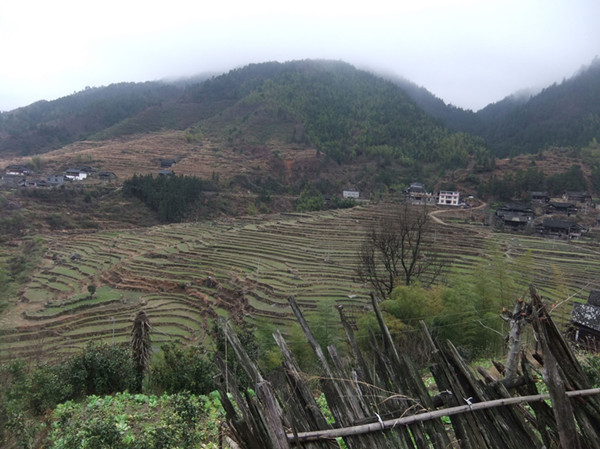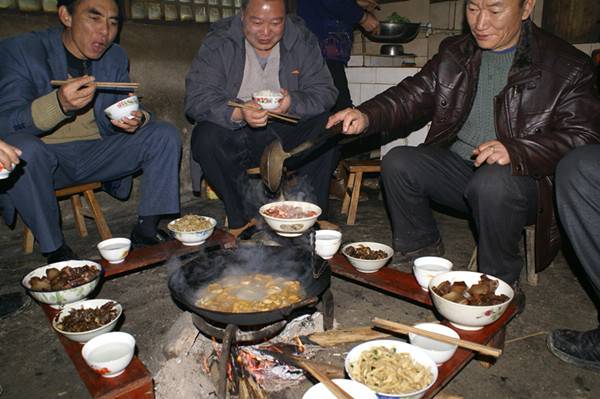Wutuan——A Charming And Mysterious Land
Source:Shaoyang International CultureWriter:Ai Zhe and xiao DingTime:2014-04-02Clicks:次
Wutuan——A Charming And Mysterious Land
Reporter: Ai Zhe; Corespondent: xiao Dingqin
On the borders of Chengbu County of Nunan and Longsheng County of Guangxi are distributed not only national key Nanshan Scenic Areas, national Gutian Wetland and also well-preserved unique and original customs of Miao Nationality. A tourist expert once stated out that the bordering areas were extremely valuable for tourism with their beautiful sceneries and folk customs worthy to be developed, and that the areas could match those promoted on the programme of “China Travels Along The North Latitude 30°”on CCTV.Reporter: Ai Zhe; Corespondent: xiao Dingqin
Wutiuan, a small town situated on the borders, has too much unknown to the outside world. In middle March, we made a special trip to it to search for the customs and culture that have existed for a thousand years, and to experience the untraveled primitive mistery and beauty.
Harmonious Ecology: Beautiful Folktales Of Giant Trees
Our car arrived at the foot of the Nashan Mountains and after a sudden turn brought us to Wutuan Town. We got off and stood on the road of Tengping Village. Looking up we saw a towering ever-green Chinese yew ahead of us.Hundreds of meters away were thick, dark green and flourishing woods.
We went up to it while singing high praises of it. We were about to hold its trunk in our arms when someone cried out, “Look! There is a greater one.” About one hundred meters away, a giant old tree almost twice as high as the first one stood there reaching to the sky. It was leafless. We approached to it in a hurry and saw a thick layer of heart-shaped fallen ginkgo leaves on the ground.
A local villager named Xiao Daze told us that local people called the Chinese yew “thousand-year Chinese yew” and the ginkgo “ten-thousand-year king of ginkgo”.It takes five people to hold the Chinese yew with their arms put together while it takes seven people to do the same to the ginkgo tree. Miao people have a custom of adoring old trees, Xiao Daze said, and they earnestly hope that holly trees will bring happiness and health to the villagers. When a villager suffers from a disease or a misfortune, he just needs to walk around the holly tree. Then he will get well or his misfortune will turn out to be a good fortune. The villagers told us proudly that every year even people from Longsheng and Ziyuan Counties of Guangxi Province would come to walk admiringly around the tree praying for blessings. At the bottom of the tree trunk, there was a hole, in which there were piles of coins that adorers had put. There were several walking sticks. It is said that some adorers with difficulty in walking restored their health and were able to walk easily immediately after they had kowtowed to the tree. Then they left their walking sticks in the hole. The most strange thing is that the hole which was large enough to hold five to six people ten years ago is now growing smaller and smaller.
Lan Lilong, secretary of the village branch Party committee, told us that there were two Chinese yew trees. The one beside the ginkgo tree is a male tree which does not bear red beans. The other one that grows beyond the hill col is a female tree that can bear red beans.The two trees are husband and wife. They look at each other expressing their innermost feelings. Young people regard them as“love trees”. When a couple fall in love, they first adore the male tree and then the female. They will pick red beans, which they present to each other as symbols of their love.
While we were lost in the beautiful folktale, Zhu Shaohua, one of our group, said, “Let’s go to see the king of trees!”Then we drove to the central school of the town. As soon as we got off excitedly, a strong tall pine tree came into our sight. Zhu Shaohua introduced, “The tree in Chengbu County called ‘king of Chinese fir in China’ is as old as one thousand six hundred years. This pine tree is at least a thousand years old. So it deserves being called ‘king of pine trees in Hunan’”.
We were unexpectedly surprised that there were so many rare ancient trees in Wutuan. We witnessed the excellent ecological environment. Wherever we went, we could see green mountains and clear streams. We felt a ecological beauty, a harmonious beauty and a mental beauty.
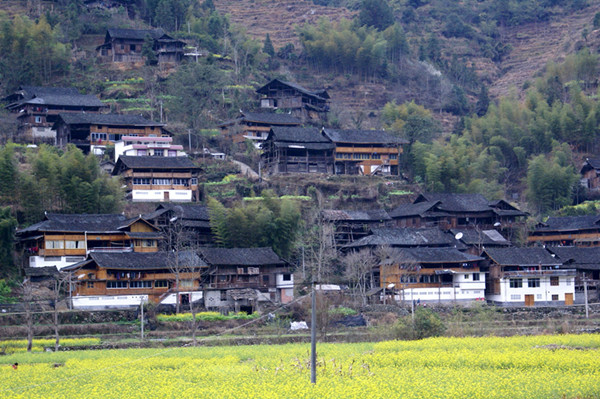
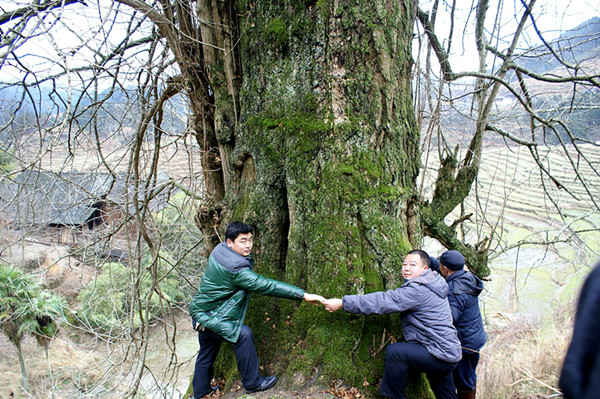
Mysterious Marriage Custom: Freedom of Love In Aotou
In Wutuan Town there is a place called Aotou that needs mentioning. In Chengbu people’s eyes, Aotou is full of mistery and charm. Aoyou has a marriage culture similar to that in Lvgu Lake region. The two cultures are different in form, but there is no difference in the concept of sex.
Yang Qizong, a villager from Dushu Village, talked to us vividly about Aotou marriage custom before the 1970s. In Aotou, young people hunted for their lovers usually by way of antiphonic singing. There were two kinds of songs sung by them. One was folk songs and the other was love songs. A young couple would first sing folk songs. If they began to like each other they would start singing love songs. When they felt that they were really in love with each other, they would go up the hill hand in hand to continue singing even all night long. What’s more, a girl would bring her boy home for the night with her.
When a girl brought her boy home, she would treat him to a meal. Afterwards, she prepared hot water for the boy to wash his face and feet. She helped him change for a pair of clean shoes. The girl’s family would evade to provide a fine and quiet environment. After a night’s sleep the boy would lie in bed until the girl’s family came to call him for breakfast if he decided on their marriage. Otherwise the boy would leave the girl’s home at dawn. This custom is suitable for the unmarried. Married men and women were forbidden to do that.
This mysterious and peculiar marriage custom in Aotou has profound influence on Wutuan Town and other southern towns of Chengbu County as well. Although the custom has disappeared in modern civilization, it can still bring about people’s curiosity and imagination. The freedom of love and the equality of choosing a lover between men and women still exist there and are worth praising.
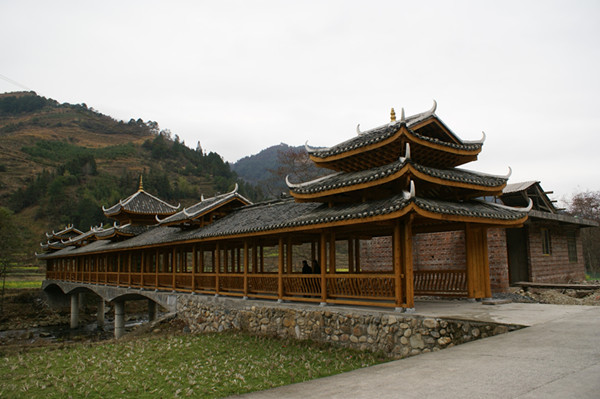
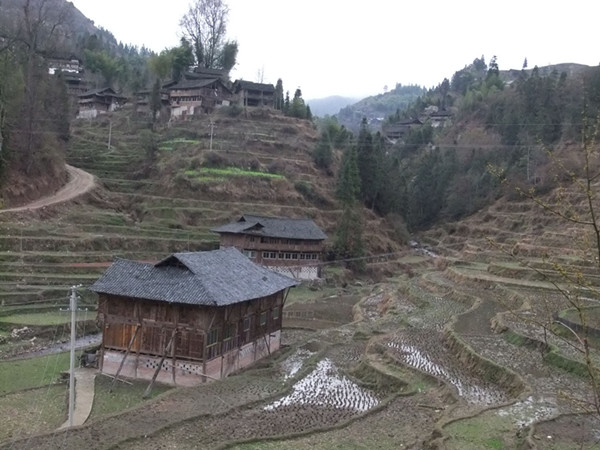
Style of Miao Village: Chaffy Dish And Oil Tea
Chengbu people love singing folk songs and drinking oil tea. If someone asks where it originated, many people will say it originated from Wutuan Town. The original way of life of Miao villages in Wutuan has influenced more than half Chengbu County.
Miao People’s enthusiasm and hospitality led us to appreciating the profound inside culture of Miao nationality. We started our appreciation from the chaffy dish at Sister Zhong Song’s home.
The chaffy dish was somewhat primitive. An iron pot was placed on an iron stand over a flaming fire. Water was boiling in the pot with smoked pork and meet of wild rabbits. Then bean curd and Chinese cabbage were put into the boiling water. In particular there was a bowl of dried hot pepper to season the dish. The pepper is a specialty in Wutuan Town. It is tasty as well as hot. Bean curd made in Wutuan is most famous for its tenderness and good taste, because the water which runs down from the Nanshan Mountains is clean and clear with calcium and zinc. An ordinary chaffy dish let us taste the food culture of Wutuan Town.
During the two days’visit, we experienced the thriving folksong and oil tea cultures. “No one who does not sing songs is talented and romantic. Anyone who is not talented and romantic will waste his life.”Wutuan Town is the originating place of Chengbu folk songs. Here all can sing folk songs and everyone is a goog singer. The seeds of folk songs spread all over the land and take root in everyone’s heart. Oil tea is a marking food of Miao People in Changbu County. The process of making oil tea is very complex because of its over ten kinds of materials. Generally, people in Wutuan had breakfast and supper with a course of tea at noon in a day. At lunchtime they drink tea with some subsidiary food in addition. It is an eating custom. They “would live without meat for a month rather than without tea in a day”.
Zhong Yongliang, a leader from CPPCC of Wutuan Town, told the reporter that Wutuan had a characteristic festival culture. There are festivals every month and every season. One of the most important festivals is “Spring Festivity”. It falls on lunar February, so it is also called “February Festivity”. After this festival, all activities that are not related to farming have to stop. Thus the festival marks the beginning of farming production. Besides, people of the Lan clan observe “Black Rice Festival”on the eighth day of lunar April in memory of their ancestor Lan Yu who aided in founding the Ming Dynasty.
Three day’s interview finished before we realized. We were so deeply impressed by
the warmth and generosity of Miao people that we were reluctant to leave. On the departure we could not help thinking: with a colorful ecological culture, a mysterious marriage culture and a primitive lifestyle of Miao vollages, isn’t Wutuan Town at the foot of the Nanshan Mountains a destination that tourists most long for? (translated by Yi Daoqun)
